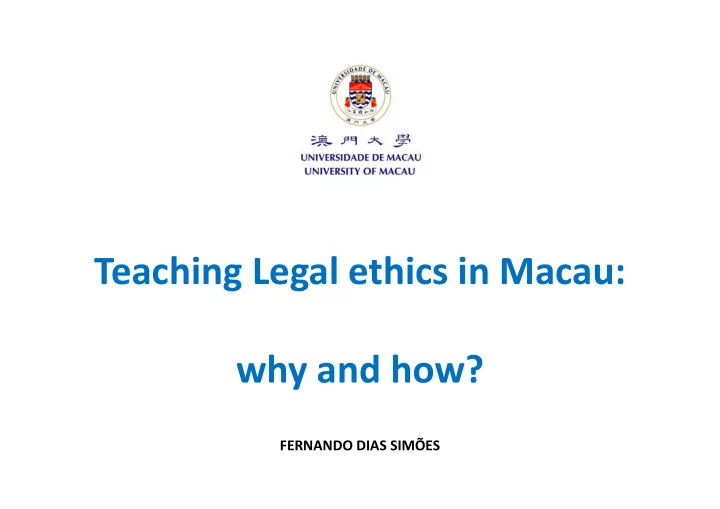

Teaching Legal ethics in Macau: why and how? FERNANDO DIAS SIMÕES
Macau SAR of the People’s Republic Of China Established in 1999, after four centuries of Portuguese rule Enjoys a high degree of autonomy – ‘One Country, Two Systems’ principle The legal system is Portuguese-based and bilingual : both Chinese and Portuguese are official languages Portuguese language is still widely used in judicial proceedings
Most existing doctrinal research material comes from Portuguese academics For those who are not familiar with either Portuguese or Chinese, access to Macau laws and regulations becomes quite difficult There are some English translations available, in an effort to make the laws more accessible to foreign investors Understanding English translations of Macau laws is still a challenge for Common Law lawyers – the advice of bilingual specialists is essential
Legal education in Macau Shadows the Portuguese long-established legal education Law schools tend to over-emphasise the academic side of legal education and not consider the professional or practical one Faculty of Law of the University of Macau: offers bachelor programmes in Chinese and Portuguese , aimed at preparing jurists who are familiar with Macau SAR legal system – the teaching system of the Faculty basically follows the Roman-German regime
Faculty of Law of the Macau University of Science and Technology (MUST): only offers a Bachelor’s degree in Chinese . Normally students fail approval in the Macau Lawyers Association’s exams In both universities, Legal curricula do not would include a specialization in Legal Ethics Law schools usually say their role is to graduate jurists, not to create lawyers or judges Legal ethics is not taken very seriously
Europe: the Bologna Declaration (1999) Adoption of a system of two cycles based broadly around the Anglo- American model – minimum of 3 years (undergraduate) study The current Portuguese system of legal education requires four years of study in order to sit for the first Bar Association exam The reduction of the length of the first cycle of studies to four years, where it used to last for five years, is not consensual
Teaching Legal Ethics during the internship In the absence of law schools’ specific education programmes, it is up to the local bar association to fill the gap during the first years of apprenticeship More professional approach, at least towards deontology In Macau, graduates in law who wish to act on behalf of clients before a court of law must register at the Macau Lawyers Association
Article 25 of the Rules on Access to Advocacy: the internship has a academic component, aiming at deepening matters of university study, as well as the ethics of the profession and other matters not normally included in the university curriculum , taught alongside the practical component Professional Deontology is a mandatory module, centred almost entirely on the study of professional regulations (Deontological Code) Focus on Attorneys’ deontology , not discussing the problems which are connected with other professions (lawyers in a broad sense)
Teaching Legal Ethics in Macau – is it possible? The bachelor degree in the University of Macau follows the former Portuguese tradition (five years of study) The Bologna Process has had a dramatic impact : Law Schools had to focus on “core” subjects The introduction of Legal Ethics may be extremely difficult, as it would imply the elimination of classic or traditional fields of study
A different solution would be to refer Legal Ethics courses to the Master lever, or to offer them as optional courses Neighboring universities in Hong Kong have moved in 2008 from a three to four year LLB curriculum, creating additional pressure on the traditional Macanese curriculum
Teaching Legal Ethics in Macau – challenges Students are characteristically relativist about ethics: they see ethics as being a matter of opinion rather than as a subject that can be taught It is a challenge to get students to address ethical issues in a systematic, scholarly way Good teaching techniques: using case studies, limiting class size to twelve students, role-playing…
Under-construction outline: - Ethics and Law : Law and morality - Professional regulation : Representative and regulatory functions of professional bodies; education, training and conduct; investigation and discipline - Professional ethics : Codes of conduct; Duty to the Court and to the administration of justice; Duties to clients; Loyalty; competence; confidentiality; conflicts of interest - The "corporatization of law practice" and related problems - Professional responsibility and professional liability insurance
Recommend
More recommend